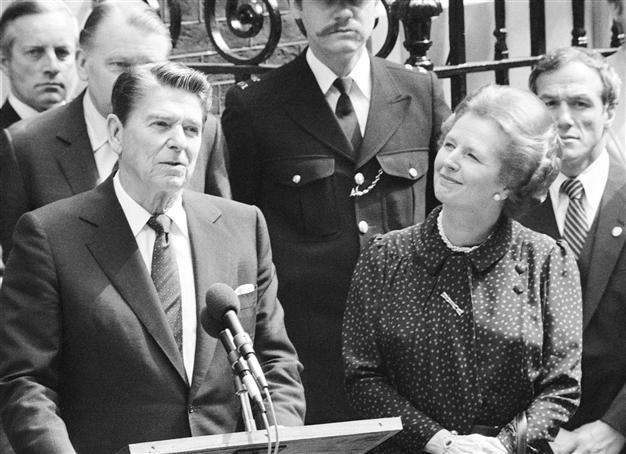Secret files shed light on contacts between US, UK
WASHINGTON

In this June 9, 1982 file photo, Britain’s Prime Minister Thatcher (R) smiles as US President Reagan makes a farewell speech in London. AFP photo
Britain’s former Prime Minister Margaret Thatcher wrote an emotional letter to U.S. President Ronald Reagan during the 1982 Falklands War, calling him the “only person” who could understand her position, formerly secret documents showed Dec. 28.
Newly declassified files from 1982 lift the lid on contacts between the two leaders over the crisis and reveal the extent of the pressure Thatcher felt she was under when Argentina invaded the remote South Atlantic archipelago.
‘Worst, I think of my life’In one file, the tough, outspoken Thatcher called the build-up to the Argentine invasion the “worst, I think of my life,” while letters to Reagan from the time show her reliance on the U.S. president and their close working relationship.
“I am writing to you separately because I think you are the only person who will understand the significance of what I am trying to say,” Thatcher told Reagan in one letter. Despite losing several warships, the British eventually reclaimed the South Atlantic islands 74 days later. Elsewhere, the files show that Thatcher stressed the special relationship between the two countries as she requested Reagan’s help in a letter signed off with “Warm personal regards, Margaret.”
“I also believe that the friendship between the United States and Britain matters very much to the future of the free world,” she wrote. Secret for 30 years, the files reveal Thatcher’s political maneuvering during other events in 1982, including the Iran-Iraq war, the imposition of military rule in Poland and the Israeli invasion of Lebanon.
They also show that British attitudes to its U.S. ally were less deferential than the prime minister’s letters to Reagan suggest.
In a transcript of a telephone conversation between Thatcher and her foreign minister, the prime minister criticized Reagan’s communication style, describing a message from the president as “so vague I didn’t think it was worth reading when it came in at half-eleven last night.”
In another file, she noted “the U.S. just does not realise the resentment she is causing in the Middle East,” while a Foreign Office briefing on Reagan described the actor-turned-politician as “knowing much less than he seems to.”
